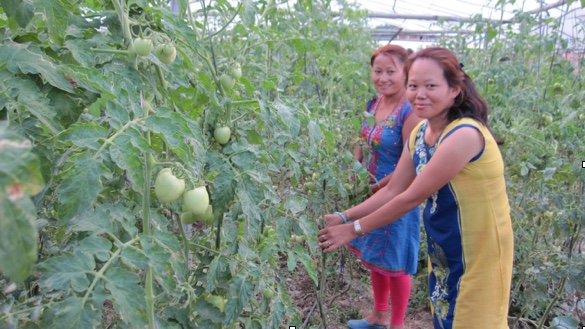-
About
- Our Work
- Get Involved
- Stay Updated
Fostering Gender in Nepalese Agriculture

Mrs. Chandra Kala Shrestha, a 31 year old woman has been practicing modern agriculture since 2011 in her small sized farm in Madhyapur Thimi, Nepal. She grows mostly offseason vegetables like tomatoes and pumpkins on her 0.3 ha of land and is continuously supported by her husband, Mr. Anil Kumar Shrestha as far as agricultural operations are concerned.
Like many other women in her area, she is quite familiar with farming At an early age, she went abroad for further studies and spent five years studying Multimedia designing. Later on, she came back to put her acquired knowledge and experience in serving her home country.
In a bid to understand her motivation into farming, i visited her in her farm and had a Q&A as thus;
Nikita: Mrs Shrestha, why did you return to your home country?
Mrs. Shrestha: I believe that agriculture is the best one service through which we can serve our nation forward. If modern agriculture is combined with youths, we can economically transform this country within years. That’s why I decided to help do that.
Nikita: How is it being a woman in agriculture?
Mrs. Shrestha: I am taking responsibility for most of the decisions of the farm. Previously, my neighbors used to tell me that educated people should not be engaged in agriculture and farmers rarely wear new or good clothes though I seemed well dressed up in farm. In our male dominant society, women are not encouraged to become farmers by either men or women and therefore they do not aspire to be farmers. In addition, encouraging women to farm comes with hidden fear as it could undermine the men’s role.
Nikita: You never learnt any agricultural related course in school. How comes you are good in farm management?
Mrs. Shrestha: I have been implementing improved technology in farming after getting training from government’s agencies on organic farming as well as integrated pest management. Now, I have a young child and we have diversified our production from subsistence to producing for the local market. In addition, i have figured its only fair to spread the farming word albeit working as an unpaid community based extension agent to help other women get motivated to start farming.
I think there is still a problem with access and availability of gender sensitive practices like, literacy program for rural women, farmer to farmer exchange program and “mentoring” opportunity for women producers in our society. But since Nepalese agriculture is on an increasing trend as far as feminization in agriculture is concerned, we might have a potential to ensure sustainable management of land and associated biodiversity besides being viewed as primary food providers for our families as well as key players in efforts to expand agriculture to grow nations’ economies. As such,we should give priority to rectify gender sensitive issues to improve extension service delivery and in such ways, farming can still attract new talent and youth, since to speak of agroecology without women will be a complete waste of time.
I couldn’t agree no more!
Tags:About the author
Related Posts
Comments
No comments made yet. Be the first to submit a commentBy accepting you will be accessing a service provided by a third-party external to https://www.ypard.net/
Get in touch
Email: [email protected]
YPARD Global Coordination UnitHosted by AGRIDEA and the Czech University of Life Sciences Prague
Lausanne, Switzerland and Prague, Czech Republic - Our Work

